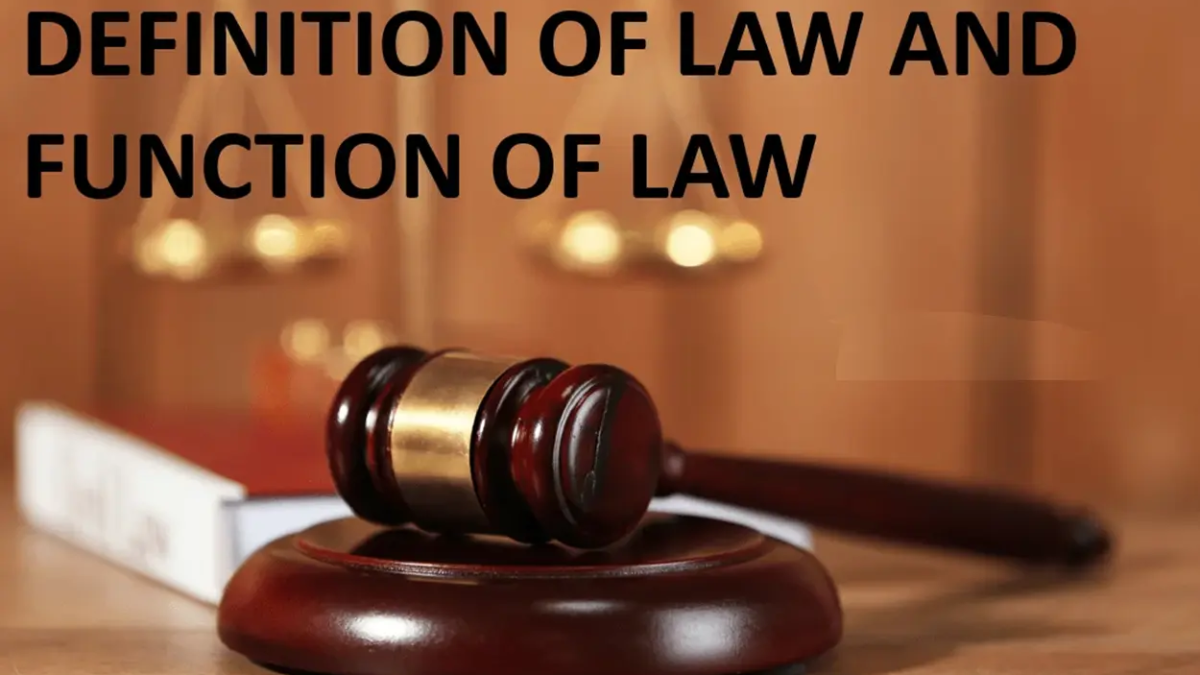By – Akanksha Kumari, BBALLB, 2nd Year Student, Amity Law School, Amity University, Gurugram
The word ‘Law’ has been derived from Teutonic word ‘lag’ which means definite or fixed. On this basis law can be stated as “a definite rule of conduct and human relations.” It also means a uniform rule of conduct which is equally applicable for/to all the people of the state. Law prescribes and regulates general conditions of human activity in the state.
Meaning of Law
In its simplest form, law refers to set of rules established by a governing body to regulate society’s behavior. It ensures order, justice, and harmony creating a predictable environment where citizens know their rights and duties.
Definition of Law
Various scholars and jurists have defined law, each emphasizing different aspects therefore defining the concept of law by four jurists. These are:
John’s Austin Command Theory: According to Austin, Law is the command of the sovereign. It is the command of the superior to an inferior and the force is sanctioned behind the law. Here, sanction means the punishment that are accompanied with law.
- Commands, are expression of a desired given by superiors (sovereign) to inferiors (general public). It is important to know that in order to fulfill a command. It is important to have a sanction attached to it, therefore it is the sanction that makes a request different from command. According to Austin, command, sanctions and duties are inter-connected because receiving a command from the superiors becomes duty of an inferior to follow the command otherwise there will be threat of sanction.
- Sovereign, by the name suggests someone who possesses supreme or alternate power to whom the entire population obeys and who is not ruled by anyone. It is the command of the state which is backed by coercive force.
- Sanction, this term is derived from roman law, it is the instrument of coercion by which any imperative law is enforced. It is a threatened system of penalty for disobeying a law or rule.
Holland External Behavior Theory: According to Holland, a law is a general rule of external behavior enforced by sovereign authority.
- General rule, It applies equally to all individuals under the authority of the sovereign. It is not based on case-by-case exceptions but is a universal rule applicable to all who are subject to the jurisdiction of that legal system.
- External behavior, this means that the law is concerned with how individuals act or behave in society, rather than their internal thoughts, desires, or morality.
- Sovereign, suggests anybody who possess supreme or ultimate power to which the entire population obeys. It is generally the command of the state which is backed by its coercive power.
Salmond: According to Salmond, law consists of set of principles recognized and applied by the state in the administration of justice. Law has also been defined as a collection of binding rules of human conduct prescribed by human beings for obedience of human beings. Therefore, law implies rules of principles enforced by court of law. Rules of law are binding; hence they are certain.
- Set of Principles, Salmond emphasizes that law consists of principles. These principles are not arbitrary but are recognized by the state and form the foundation for the administration of justice. These rules provide the framework for regulating the behavior of individuals within a society.
Hart: According to him, law is a coercive instrument for regulating social behavior law can be defined as a command backed by sanction.
- Social Behavior, behavior that influences or is influenced by other members of the society. It is the activity of an individual which qualifies, modifies or otherwise alters the act of another individuals.
- Command, it means giving an authoritative order given by the superiors to the inferiors. Sanction is the most important ingredient of command. Receiving a command becomes a duty to follow otherwise there is threat of sanction.
- Sanction, it is the instrument of coercion by which a state or society maintains law and order. It is a form of penalty exercised when laws are disobeyed.
Definition of Law given under Article 13 of Indian Constitution
- Law includes any ordinance, order, bye law, rules, regulation, notification, custom or usage having in the territory of India.
- Laws in force includes laws passed or made by the legislature or other competent authority in the territory of India before the commencement of the constitution and not previously repealed, notwithstanding that any such law or any part, thereof may not be then in operation either at all or in particular areas.


Add a Comment